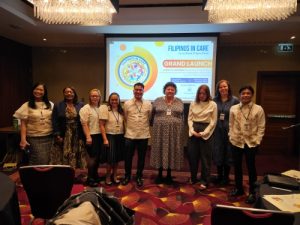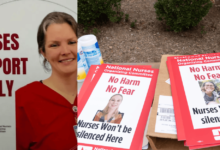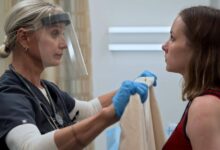New nurse-led group launched for Filipinos in social care

The “unseen” work of Filipino staff in the UK social care sector is to be highlighted through a new support and advocacy group.
The nurse-led Filipinos in Care organisation was officially launched at the end of April and now has almost 100 members.
“We have to continue making that noise that yes, we are here, not just the NHS”
Xyza Macutay-Malloch
The group is aiming to address the “unique needs” of Filipino social care workers by offering them pastoral support, professional development advice, networking opportunities and national representation.
It has been founded and is now chaired by Kier Dungo, nurse and a managing director of Gold Care Homes.
Speaking to Nursing Times, Mr Dungo said social care was “often seen as the back end of the system”, and he wanted the sector to get equal recognition to that received by the NHS.
“For me, it is about raising the profile of the Filipinos working in social care and equally promoting and championing social care as part of the wider healthcare system,” he said.
He noted how the issues faced by staff and leaders in social care were different to those in the NHS and that was why a dedicated group was needed.
For example, he said Filipinos in Care was going to be holding a webinar in July focusing on the ‘supporting information from employers (SIFE)’ pathway.
SIFE is a Nursing and Midwifery Council (NMC) scheme that allows internationally educated professionals to prove their English language skills via a reference from their UK employers.
Mr Dungo said SIFE was causing “a confusion in social care right now” because of the requirement for the referees – usually the applicant’s managers – to be NMC registrants.
However, in some care homes, managers were all non-clinical, making this requirement difficult to meet, he noted.
Another key aim of the group was supporting Filipino staff to “go up the career ladder”, added Mr Dungo.
Xyza Macutay-Malloch, vice president of Filipinos in Care, said the hope was to “inspire the next generation” of Filipino social care workers, and provide support to those already in the workforce.
The issue of exploitation of overseas care workers, which has been placed on the national agenda recently, was one of the driving forces for the new group, noted Ms Macutay-Malloch.
“People are being trafficked…which has been a very big concern,” she said.
“Kier [Dungo] receives a lot of phone calls asking for help about this. People pay a lot of money to be here and then in the end they’ll just have like six-months work visas.”

England chief nurse for adult social care, Deborah Sturdy, at the launch event
Ms Macutay-Malloch said, through Filipinos in Care, care workers could be connected with a “fellow Filipino” for advice, support and signposting.
Qualifying as a nurse in the Philippines, Ms Macutay-Malloch came to the UK in 2009 and has worked her way up from care assistant to care home manager.
She currently manages a 37-bed nursing home in Tetbury, Gloucestershire and is also a parish councillor for the town.
In 2021, Ms Macutay-Malloch was awarded a British Empire Medal (BEM) and she said Filipinos in Care would be working to ensure more social care workers received the recognition they deserved.
“We need to be championing,” said Ms Macutay-Malloch.
“It’s just like a simple recognition, we had the clap and all that during the Covid pandemic, our cousins from the NHS were celebrated every day. But social care, we were in the background.”
However, she said the Covid-19 pandemic did help to raise awareness of the work done in social care and this now needed to be continued and built on.
“We have to continue making that noise that yes, we are here, not just the NHS,” she added.
“And the NHS is crumbling every day, but the social care needs to be stronger, to help them out. Because at the end, we are the extension of NHS anyway.”
“Maybe some other Filipinos will find it inspiring and will follow the footsteps”
Jay Trondillo
Jay Trondillo, president of Filipinos in Care, said during the pandemic he essentially had to move into his care home because there were so many staff members absent due to Covid-19.
There were many other managers and staff who did the same thing to keep their care homes running, noted Mr Trondillo, who is a regional director for Maria Mallaband Care Group.
A registered nurse, Mr Trondillo came to the UK in 2017 and he said he had met countless “inspiring” people in social care but “nobody’s celebrating them”.
“So that’s something that we are here for, we’re going to be celebrating that, we’re going to be sharing those kinds of stories,” he said.
“Not to brag, but just to share, because maybe some other Filipinos will find it inspiring and will follow the footsteps, and ultimately [this] will impact the whole sector.”
Charito Romano, secretary for Filipinos in Care, is also a registered nurse and a clinical service manager in Bupa care homes.
While initially the group was going to be an international nursing and midwifery association (INMA), it has now been extended to cover all professions including those in non-clinical roles.
Ms Romano said this was important because “anyone can struggle”, and the value of the group was it could link people up with those who have experienced similar issues “first hand”.
She said, currently, the work of social care staff was “unseen” and “unheard” and Filipinos in Care was aiming to address this.
“It’s really just [to create] a nurturing and inclusive environment that respects and celebrates social care,” she said.






